Colombo, March 2 (newsin.asia): The Provincial Council of Sri Lanka’s Tamil majority Northern Province has passed a resolution asking the UN Human Rights Council (UNHRC) to extend “Universal Jurisdiction” to Sri Lanka and make Sri Lanka accede to the Rome Statute which enables criminal cases to be taken to the International Criminal Court.
Universal Jurisdiction allows states or international organizations criminal jurisdiction over an accused person regardless of where the alleged crime was committed, and regardless of the accused’s nationality, country of residence, or any other relation with the prosecuting entity.
Crimes prosecuted under Universal Jurisdiction are considered crimes against all.
The resolution passed on February 27, Sri Lanka’s Northern Provincial Council called upon the Members Countries of the UNHCR to refer the Sri Lankan case to an “International Judicial Mechanism headed by the UN.”
I said: “Without truth, justice and an equitable political solution, neither reconciliation nor permanent peace is possible in Sri Lanka.”
It called upon the UN and the international community to require Sri Lanka to ratify the Rome Statute as recommended by the Office of the High Commissioner of Human Rights (OHCHR) in September 2015;
The Provincial Council demanded that the Tamil people should be recognized as a “nation with their traditional homeland in the contiguous North- East region of Sri Lanka, and that they are entitled to self- determination.”
The Council went on to calls upon the International Community, especially the United States, the European Union, and India, to mediate a political solution.

In September 2015 Sri Lanka had committed itself to set up an Impartial Judicial Mechanism which will include foreign judges, lawyers, prosecutors and investigators, to investigate the allegation of violations and abuses of human Rights and violations of international humanitarian law in the last phase of the 2006-2009 Eelam War IV against the separatist Liberation Tigers of Tamil Eelam (LTTE).
“But the Government of Sri Lanka has not only failed to take any meaningful steps towards implementing the Resolution 30/1, but also that President, the Prime Minister, and the senior members of the Government have clearly and categorically proclaimed that they will not fully implement the Resolution,” the Provincial Council said.
The resolution noted with concern that the Government of Sri Lanka has not only failed to take any sincere steps towards finding an equitable political solution, but is also insisting that the non- Buddhist people, including the Tamil people, must accept the foremost place to Buddhism demonstrating the oppressive mind-set of the Sinhalese Government.
The council’s resolution said that Sri Lanka is unable or unwilling to implement its own commitment and implement UNHRC Resolution 30/1.
It then pointed out that the Annual Report of the United Nation High Commission for Human Rights in Para V 52 Report on Sri Lanka A/HRC/37//’23 dated January 25, 2018 had said that: “The High Commissioner urges the Human Rights Council to continue to play a critical role in encouraging progress in accountability and reconciliation in Sri Lanka, it calls on Member States to explore other avenues including the application of Universal Jurisdiction, that could foster accountability.”




























































